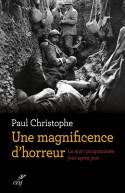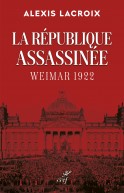
L'assistance spirituelle aux prisonniers de guerre
Collection Cerf Histoire
464 pages - oct. 2012
41,80€
En retraçant l'histoire de l'assistance spirituelle prodiguée aux prisonniers de guerre, cet ouvrage aborde un sujet original et quasiment ignoré. Le droit à la liberté religieuse et de culte étant inscrit dans les conventions de Genève de 1929, soutenir les pratiques spirituelles des prisonniers de guerre entre dans les prérogatives des organisations de secours internationales et devient un devoir des États détenteurs. Delphine Debons étudie cette action humanitaire dans sa globalité, en partant des acteurs engagés et des relations qu'ils entretiennent, jusqu'à ses effets sur les prisonniers de guerre, en passant par la réglementation mise en œuvre et les actions entreprises. Elle s'attache à comprendre ce phénomène durant la Seconde Guerre mondiale, aussi bien pour les détenus français et britanniques aux mains du IIIe Reich, que pour les Allemands aux mains des Alliés et s'intéresse principalement aux catholiques et aux protestants tout en laissant une place aux croyants des autres religions et aux différentes formes de spiritualité. Se manifeste progressivement toute la complexité de la cohabitation entre le politique et le religieux, entre l'humanitaire et la charité, entre la neutralité et l'engagement humanitaire dans un conflit armé. Se dévoilent également, comme le signale François Cochet dans sa préface, des personnalités, petites et grandes, « des hommes qui découvrent petit à petit, au fur et à mesure que la captivité s'installe, qu'ils peuvent défendre leurs droits dans ce domaine et vivre leur religion, souvent redécouverte dans les conditions tragiques de la détention ». L'auteur questionne les « résultats » de cette assistance spirituelle, offrant une réponse différenciée selon les objectifs des uns et des autres : réanimer la ferveur chrétienne du monde occidental pour les Églises ou, pour les humanitaires, soulager les souffrances quotidiennes des prisonniers de guerre.
--
Historian Delphine Debons begins by recounting the history of assistance given to prisoners of war since Antiquity, taking in Muslim and Christian practices, until modern times and the first organised works of assistance. She analyses the right to religious and spiritual help, before focusing on the Geneva Convention of 1929. In this way, the book provides a valuable overview of the historical and legal foundations of humanitarian intervention in armed conflict. In the second part of the book, the author examines the organisation of spiritual assistance in the 20th century, especially the ICRC (International Committee of the Red Cross), the Catholic Church and ecumenical organisations, then the collaboration between these institutions. Her study reveals many confessional, national, international and personal challenges in providing assistance to war prisoners, and casts light on the various structures and logistics used by the different players so that readers can evaluate the services furnished by the various parties working in competition or in complementarity. The author also analyses the captivity of prisoners during WW2: in Germany, where spiritual help for many prisoners of different origins and confessions met with strong opposition in the camps – even during the first years of the war – and the captivity of German prisoners in French and British camps, before and after German surrender. This comparative study, which treats regulations and practice, demonstrates that even if the motivations and arguments are not always the same, the different military authorities often pose the same limitations and obstacles to prisoners of war’s spiritual well-being. Although the author focuses especially on spiritual assistance to Protestant and Catholic prisoners, French, German and Polish among others – those for whom information is more plentiful - Delphine Debon’s investigation also takes in prisoners of minority confessions (Orthodox, Hindu, Jewish, Muslim and so on) as well as those who develop other forms of spirituality (philosophy, free masonry, free thinkers). The last part of the book covers the actions of international organisations and the cults and rites practiced in the camps, citing chaplains, Catholic seminarians, theology students and of course the faithful. The author explains the evolution of spiritual assistance from the disorganisation of the first months of captivity to a certain official recognition of religious communities, especially Catholic and Protestant, and the organisation of an authentic ‘captive society’. Highly original passages are devoted to the practice of worship in the camps, which lies at the origin of new pastoral and liturgical post-war changes, notably ecumenism. The pages dealing with psychological phenomena and the deep moral destitution which develops in camps among clerics and the secular alike, and which question the real value of assistance offered by spiritual assistance to war criminals, are also extremely forceful.
--
Historian Delphine Debons begins by recounting the history of assistance given to prisoners of war since Antiquity, taking in Muslim and Christian practices, until modern times and the first organised works of assistance. She analyses the right to religious and spiritual help, before focusing on the Geneva Convention of 1929. In this way, the book provides a valuable overview of the historical and legal foundations of humanitarian intervention in armed conflict. In the second part of the book, the author examines the organisation of spiritual assistance in the 20th century, especially the ICRC (International Committee of the Red Cross), the Catholic Church and ecumenical organisations, then the collaboration between these institutions. Her study reveals many confessional, national, international and personal challenges in providing assistance to war prisoners, and casts light on the various structures and logistics used by the different players so that readers can evaluate the services furnished by the various parties working in competition or in complementarity. The author also analyses the captivity of prisoners during WW2: in Germany, where spiritual help for many prisoners of different origins and confessions met with strong opposition in the camps – even during the first years of the war – and the captivity of German prisoners in French and British camps, before and after German surrender. This comparative study, which treats regulations and practice, demonstrates that even if the motivations and arguments are not always the same, the different military authorities often pose the same limitations and obstacles to prisoners of war’s spiritual well-being. Although the author focuses especially on spiritual assistance to Protestant and Catholic prisoners, French, German and Polish among others – those for whom information is more plentiful - Delphine Debon’s investigation also takes in prisoners of minority confessions (Orthodox, Hindu, Jewish, Muslim and so on) as well as those who develop other forms of spirituality (philosophy, free masonry, free thinkers). The last part of the book covers the actions of international organisations and the cults and rites practiced in the camps, citing chaplains, Catholic seminarians, theology students and of course the faithful. The author explains the evolution of spiritual assistance from the disorganisation of the first months of captivity to a certain official recognition of religious communities, especially Catholic and Protestant, and the organisation of an authentic ‘captive society’. Highly original passages are devoted to the practice of worship in the camps, which lies at the origin of new pastoral and liturgical post-war changes, notably ecumenism. The pages dealing with psychological phenomena and the deep moral destitution which develops in camps among clerics and the secular alike, and which question the real value of assistance offered by spiritual assistance to war criminals, are also extremely forceful.
- Dimensions : 145x235x30
- ISBN : 9782204096140
- Poids : 710 grammes
DANS LA CATÉGORIE HISTOIRE GÉNÉRALE
Les Grecs d'Istanbul et le patriarcat œcuménique au seuil du XXIe siècle
de Paul Dumont ,Méropi Anastassiadou
320 pages - mai 2011
L'Idéologie religieuse iranienne et ses métamorphoses
de Hossein Zahiri Mehrabadi
296 pages - nov. 2017






